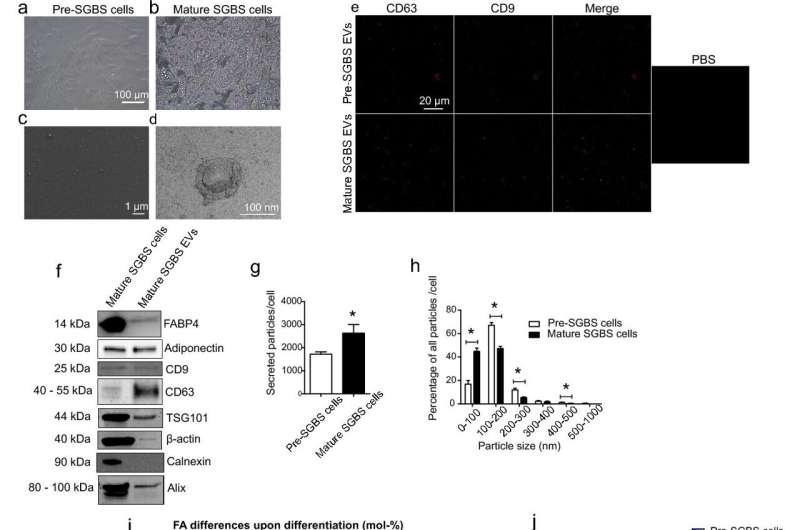This article has been reviewed according to Science X's editorial process and policies. Editors have highlighted the following attributes while ensuring the content's credibility:
fact-checked
peer-reviewed publication
trusted source
proofread
Obesity-induced inflammation increases the secretion of extracellular vesicles from adipose tissue

New research from the University of Eastern Finland sheds light on the mechanisms associating obesity with inflammation by exploring tiny membrane particles, known as extracellular vesicles, secreted by human adipocytes.
The study found that obesity-induced adipose tissue inflammation increased the secretion of extracellular vesicles, which may contribute to the detrimental health effects of obesity. The findings were published in the Journal of Translational Medicine.
When people gain weight, their adipose tissue expands, which gradually leads to its inflammation, and to insulin resistance. Normal adipose tissue function is disrupted, and it starts to release lipids and inflammatory cytokines.
In other words, adipose tissue is not passive, but it actively communicates with other tissues, and also contributes to the pathogenesis of various diseases and conditions.
Recent years have seen the publication of intriguing studies suggesting that adipose tissue also secretes tiny membrane particles, i.e., extracellular vesicles, which may play a significant role in obesity and in obesity-induced metabolic disorders. However, previous studies have mostly examined extracellular vesicles obtained from adipocytes and adipose tissue of mice.
Visceral adipose tissue secretes more vesicles than subcutaneous adipose tissue
Extracellular vesicles can be found in all body fluids, and their discovery has revolutionized our understanding of intracellular communication. In essence, cells use them to convey instant messages between cells and to alter each other's function. Extracellular vesicles secreted by different tissues, including adipose tissue, may be associated with the pathogenesis of various diseases. However, the mechanisms that increase the secretion of extracellular vesicles from adipocytes have not been studied in humans before.
The present study showed that in obesity, adipose tissue inflammation increases the secretion of extracellular vesicles from human adipocytes. In addition, the study was the first to demonstrate with statistical certainty that human visceral adipose tissue, i.e., fat accumulated in the abdominal cavity, secretes more extracellular vesicles than subcutaneous adipose tissue. The increased vesicle secretion from visceral adipose tissue was also associated with an increase in plasma triglyceride levels.
The researchers used a human-derived adipocyte cell line as well as adipose tissue samples collected from bariatric surgery patients at Kuopio University Hospital and Cattinara Hospital in Trieste.
In addition, the researchers compared extracellular vesicles isolated from the plasma of individuals with normal weight, and from the plasma of bariatric surgery patients. The plasma of bariatric surgery patients contained a higher number of extracellular vesicles containing adiponectin, which is a mediator produced by adipose tissue.
This is a further indication of increased extracellular vesicle secretion from adipose tissue in obesity. Overall, the increased number of extracellular vesicles in the plasma was associated with adipose tissue inflammation and with high BMI in bariatric surgery patients.
The findings provide new insight into the function of adipose tissue, as well as into the development of novel treatments. There are ample opportunities for further research, as obesity-induced secretion of extracellular vesicles may lead to, e.g., inflammation and insulin resistance in other tissues they end up in.
"Using microscopy, we showed, for the first time, that extracellular vesicles secreted by adipocytes and adipose tissue contain triglycerides, i.e., fat stored in adipose tissue. Previous studies have suggested that fats contained in extracellular vesicles secreted by adipose tissue could serve as a source of energy for cancer cells, for example," says Doctoral Researcher Johanna Matilainen of the University of Eastern Finland, the first author of the study.
More information: Johanna Matilainen et al, Increased secretion of adipocyte-derived extracellular vesicles is associated with adipose tissue inflammation and the mobilization of excess lipid in human obesity, Journal of Translational Medicine (2024). DOI: 10.1186/s12967-024-05249-w



















